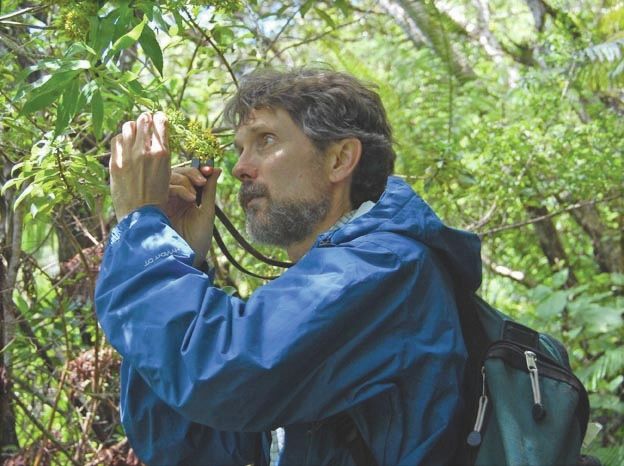KALAHEO — Plant colonization of the Hawaiian archipelago from the native temperate climates of the Pacific Northwest has captivated the attention of Bruce Baldwin for decades.
Now, the research associate in vascular plant systematics for the National Tropical Botanical Garden and professor of integrative biology at the University of California, Berkeley, will be honored for his achievements in tropical plant science.
The Robert Allerton Award for Excellence in Tropical Botany or Horticulture will be presented to Baldwin during the NTBG Board of Trustees meeting in Sonoma, California, on Oct. 12.
“Dr. Baldwin is an important collaborator for many in Hawaii,” said Chipper Wichman, director of NTBG. “He has worked tirelessly for decades to better understand the unique relationships tropical plants share with their distant continental cousins.”
He continued: “Bruce’s research sheds new light on the origins of the Hawaiian flora and has implications that extend well beyond the Pacific.”
The award announcement surprised Baldwin, who said he’s more of a plant evolutionary biologist than a tropical botanist.
“I’ve been more interested in the transition from temperate to tropical environments,” Baldwin said. “There’s a lot of tropical botanists out there in the world, that they thought what I was doing was worthy of an award is surprising.”
Baldwin’s research focuses on plants in the silversword alliance, which are found on six of the Hawaiian Islands. Geographically, he’s centered on the temperate vegetation of California and looks at the evolutionary relationships between plants native to California and Hawaii.
“I grew up with plants in the Mediterranean climate here in California,” Baldwin said. “What interested me was how plants almost exclusively found in that climate could colonize the tropical archipelago.”
Generally plants migrate from tropic to temperate climates, Baldwin said, but the colonization was able to occur because of the elevation of the Hawaiian Islands, mostly facilitated by birds.
“This group (silversword plants) arrived pretty early in the archipelago and it seems to have a Kauai origin, probably working its way down the island chain as new islands arose,” Baldwin said. “There’s a lot of local endemics on Kauai, too, and more species diversity within the overall evolutionary lineage.”
Those extreme diversities within a species are the focus of much of Baldwin’s work, and he said that “evolutionary flexibility” is readily seen on Kauai.
“Some of the changes that have happened in the silversword alliance on Kauai are about as extreme as anything you see in the plant kingdom,” Baldwin said.
That evidence indicates that evolutionary changes can happen in radical ways very quickly within the silversword alliance, and that conclusion could have resounding implications.
“That’s kind of a hopeful message,” Baldwin said, “that evolution has so much potential, if given the room to occur.”
The Robert Allerton Award is named in honor of one of the founding trustees of NTBG and was first presented in 1975. Other recipients include Peter Raven, Sir Ghillean Prance and Sherwin Carlquist.
“I’m extremely honored and humbled. The previous recipients are people I respect a lot,” Baldwin said. “I feel that it’s a pretty special recognition that I don’t know I feel I completely deserve, but that makes it all the more special to me.”






